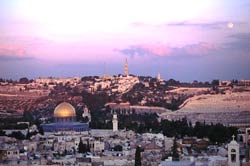|
|
In
the Beginning - A Hisitorical Look at the Middle East Conflict
November 2000 Commentary by Rick Francona
Middle East politics are replete with ethnic, racial, and religious terms – often used incorrectly. Among these are the term “anti-Semitic”, confusion between “Israeli” and “Jew,” mistaken belief that all Arabs are Muslim, and misunderstanding of the term “Arab.” Perhaps a bit of historical perspective will help in understanding the modern politics of the region. The accepted common progenitor of both the Arabs and Jews is Abraham (Abraham in Arabic is Ibrahim, and he is always referred to as Hadhrat Ibrahim, or “His Excellency Ibrahim”). Understanding the story of Abraham is important to understanding the tensions in the region. For example, Jewish texts cite a covenant between God and Abraham giving Abraham’s descendants all of the land between the Nile and the Euphrates. These boundaries are depicted on murals in some Israeli official buildings, giving rise to Arab fears of a desire to establish a “Greater Israel” based on Biblical rationalization. Immediately we come to some of the more common misconceptions. Abraham is a descendant of Noah’s son Shem; these descendants are known as Semites. Technically, the term Semitic refers to both Arabs and Jews, but over the years has almost been exclusively applied to Jews and things Jewish. When Arabs are accused of being anti-Semitic, they actually cannot be. The more proper term is probably “anti-Israeli.” Also, Hebrew and Arabic are both Semitic languages. This is important when we deal with the definition of who is an Arab. While the Jews are exclusively descendants of Shem and therefore wholly Semitic, some people that are considered Arabs are not. While most are in fact Semitic, many of the inhabitants of North Africa and Sudan are descendants of Noah’s son Ham. In the northern parts of the Middle East, there are people referred to as Arabs that are descendants of Noah’s son Japheth. The common denominator here is the Arabic language. Therefore, Arabs are an ethno linguistic group – anyone who speaks Arabic as his or her native language is considered an Arab. The sons of Abraham (Hadhrat Ibrahim) Understanding the status of the two oldest sons of Abraham 4000 years ago is key to understanding the differences between Arab and Jew today. Abraham was born in Ur, in what is now Iraq, the tenth generation descendant of Noah and son of a carpenter. After a falling out with his father over religious beliefs, Abraham and his wife Sarah left Ur for what is now Israel and the area of the Palestinian Authority (West Bank). Later, they moved to Egypt where they were presented with a servant, Hagar (Hajirah). Sarah and Abraham had not been able to have children. In one of the first instances of surrogate motherhood, Sarah proposed that Abraham and Hagar have a child that Sarah would raise. The child of that union was named Ishmael (Isma’il). Abraham, Sarah and Ishmael moved to what is now Saudi Arabia, where the father and son built the shrine known as the Ka’aba, the holiest site in Islam. Thirteen years later, Sarah gave birth to a son, Isaac. Shortly after the birth, Sarah forced Hagar and Ishmael out of the household. Given the circumstances of the births, who is entitled to the birthright of Abraham? The first born, albeit a bastard, or the son of the legally wed Abraham and Sarah, but the second son? Confusion over terminology in the Jewish Torah and the Arab histories of the account of the birth of Isaac and Ishmael causes further problems. Hagar is referred to as a slave in the Torah, but Arab scholars insist that the wording does not mean “slave.” Arabs are sensitive to this distinction, as Jews have often cited the illegitimate birth of Ishmael to a slave girl as an indicator that the Arabs are inferior to the descendants of the legitimate Isaac. It is these circumstances that have gave rise to Jewish law that establishes Jewish nationality through the mother, not the father. Abraham died in Hebron (Al-Khalil)
on the West Bank. His tomb is revered by both Arabs and Israelis, by Jews,
Muslims and Christians.
|
 (Note:
Names here are the most commonly used, which in most cases are derived
from the Hebrew. Each has an equally valid Arabic counterpart.)
(Note:
Names here are the most commonly used, which in most cases are derived
from the Hebrew. Each has an equally valid Arabic counterpart.)